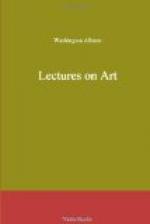But let us see how far it is possible to realize the Idea of a perfect Human Form.
We have already seen that the mere physical structure is not man, but only a part; the Idea of man including also an internal moral being. The external, then, in an actually disjoined state, cannot, strictly speaking, be the human form, but only a diagram of it. It is, in fact, but a partial condition, becoming human only when united with the internal moral; which, in proof of the union, it must of necessity indicate. If we would have a true Idea of it, therefore, it must be as a whole; consequently, the perfect physical exterior must have, as an essential part, the perfect moral. Now come two important questions. First, In what consists Moral Perfection? We use the word moral here (from a want in our language) in its most comprehensive sense, as including the spiritual and the intellectual. With respect to that part of our moral being which pertains to the affections, in all their high relations to God and man, we have, it is true, a sure and holy guide. In a Christian land, the humblest individual may answer as readily as the most profound scholar, and express its perfection in the single word, Holiness. But what will be the reply in regard to the Intellect? For what is a perfect Intellect? Is it the Dialectic, the Speculative, or the Imaginative? Or, rather, would it not include them all?
We proceed next to the Physical. What, then, constitutes its Perfection? Here, it might seem, there can be no difficulty, and the reply will probably be in naming all the excellent qualities in our animal nature, such as strength, agility, fleetness, with every other that can be thought of. The bare enumeration of these few qualities may serve to show the nature of the task; yet a physically perfect form requires them all; none must be omitted; it would else be imperfect; nay, they must not only be there, but all be developed in their highest degrees. We might here exclaim with Hamlet, though in a very different sense,
“A combination and a form indeed!”
And yet there is no other way to express physical perfection. But can it be so expressed? The reader must reply for himself. We will, however, suppose it possible; still the task is incomplete without the adjustment of these to the perfect Moral, in the highest known degrees of its several elements. To those who can imagine such a form as shall be the sure exponent of such a moral being,—and such it must be, or it will be nothing,—we leave the task of constructing this universal exemplar for multitudinous man. We may add, however, one remark; that, supposing it possible thus to concentrate, and with equal prominence, all the qualities of the species into one individual, it can only be done by supplanting Providence, in other words, by virtually overruling the great principle of subordination so visibly impressed on all created life. For although,




